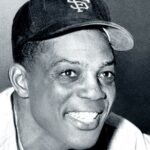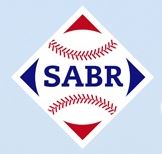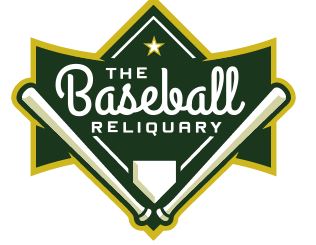As we approach the 2022 MLB All Star break, it seems appropriate to revisit past All Star Performances that Baseball Roundtable finds particularly memorable. In this post, we will look at Baseball Roundtable’s “Fifteen Most Memorable All Star Game Moments,” as well as some All Star Game Trivia Tidbits, quotes about the game from All Stars, some comparisons that show how the All Star Game has changed over the years and more. The Top Fifteen Memorable Moments will be headlined in RED, the “extras” will be in BLUE or GREEN. Note: These figures do not include the Negro Leagues East-West Games, as that data is not yet fully compiled.
ASG Memorable Moment Number One … Bill Freehan Behind the Plate for 15 Innings – 1967
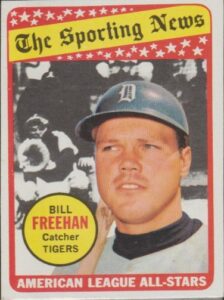 In 1967, when the National League topped the junior circuit 2-1 in 15 innings (at the time, the longest All Star Game ever, later matched by the 2008 All Star contest), Bill Freehan was behind the plate for the AL for all 15 innings – handling five different pitchers. and crouching behind 19 different batters (52 plate appearances). By contrast, the National League used three different backstops. That, for Baseball Roundtable, was a most impressive/memorable feat of stamina. It was also a pretty bold move for AL manager Hank Bauer (Orioles), keeping the Detroit Tiger catcher in the crouch for 15 innings. Got to wonder how Tigers” Skipper Mayo Smith felt about that. By comparison, the NL squad used three catchers in the game.
In 1967, when the National League topped the junior circuit 2-1 in 15 innings (at the time, the longest All Star Game ever, later matched by the 2008 All Star contest), Bill Freehan was behind the plate for the AL for all 15 innings – handling five different pitchers. and crouching behind 19 different batters (52 plate appearances). By contrast, the National League used three different backstops. That, for Baseball Roundtable, was a most impressive/memorable feat of stamina. It was also a pretty bold move for AL manager Hank Bauer (Orioles), keeping the Detroit Tiger catcher in the crouch for 15 innings. Got to wonder how Tigers” Skipper Mayo Smith felt about that. By comparison, the NL squad used three catchers in the game.
For those who like to know such things, Freehan was indeed a workhorse that season – appearing in 155 of the Tigers’ 163 games – and spending time behind the plate in in 147. Freehan was an All Star in nine of his fifteen seasons (1961, 1963-76 … all with the Tigers). The five-time Gold Glover was behind the plate in 1,577 of 1,774 MLB games. His final stat line was .262-200-758.
_____________________________________________
Ten Players Played All 15 Innings in the 1967 MLB All Star Game
American League
Bill Freehan, Tigers, C
Brooks Robinson, Orioles, 3B
Tony Oliva, Twins, Twins, CF
Harmon Killebrew, Twins, 1B
Tony Conigliaro, Red Sox, RF
Carl Yastrzemski, Red Sox, LF
National League
Roberto Clemente, Pirates, RF
Hank Aaron, Braves, started in CF and finished in LF
Orlando Cepeda, Giants, 1B
Gene Alley, Pirates, SS
By comparison, in the 2022 All Star Game, the AL used 32 players and the NL used 30 – and not a single player played the whole nine innings.
_______________________________________
Roundtable ASG Extra … A Trivia Tidbit
When the American League won the 1942 All Star Game, they used an ASG record-low 11 players. All eight position players went the distance and the team used one pinch hitter and one relief pitcher.
Here’s the AL lineup:
Lou Boudreau SS
Tommy Henrich RF
Ted Williams LF
Joe DiMaggio CF
Rudy York 1B
Joe Gordon 2B
Ken Keltner 3B
Birdie Tebbetts C
Spud Chandler P
Bob Johnson PH
Al Benton P
______________________________________________________
ASG Memorable Moments Number Two … The Splendid Splinter Shreds (splinters?) the All Star Record Books – 1946
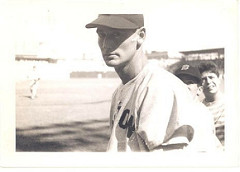
Photo by wild mercury 
Ted Williams went the distance in the 1946 All Star game – played in front of the hometown fans at Fenway and – thanks to that full-game experience – wrote his way into the ASG records books. Williams came into the game hitting .347, with 23 home runs, 82 runs scored and 71 RBI in 79 regular-season games. Compared to the day he was about to have that would look like a slump. Here’s how Williams’ day went.
In the first inning, batting third and facing the Cubs’ Claude Passeau, Williams drew a walk and then scored on a home run by Yankees’ RF Charlie Keller.
In the bottom of the fourth, leading off against new NL hurler Kirby Higbe of the Dodgers, Williams homered to give the AL a 3-0 lead.
In the bottom of the fifth, with Higbe still in the game, Teddy Ballgame came up again – this time with one out the Senators’ CF Stan Spence on third and the Browns’ SS Vern Stephens on second. This time, Williams delivered a run-scoring single.
In the bottom of the seventh, facing the Reds’ Ewell Blackwell with none on and two out, Williams singled again.
Finally, in the bottom of the eighth – facing the Pirates’ Rip Sewell and his Ephus pitch – with Stephens and Browns’ P Jack Kramer on base, William capped off his day with a three-run homer.
The AL squad prevailed by a 12-0 score – and Williams’ final tally was: four-for-four, plus a walk, two home runs, four runs scored and five runs driven in. In the process, Williams set or tied the following All Star Game single-game records:
- Runs Scored (four – Williams still stands alone);
- Total bases (ten – Williams stands alone);
- Runs Batted in (five – later, 1954, tied by the Indians’ Al Rosen);
- Base Hits (four – tying the Cardinals’ Ducky Medwick, 1937, and later matched by the Red Sox’ Carl Yastrzemski, 1970);
- Home Runs (two – tying Pirates’ Arky Vaughn, who did it in 1942; later tied by the Indians’ Al Rosen in 1954; Giants’ Willie McCovey in 1969; and Expos’ Gary Carter in 1981).
__________________________________________________________
ASG EXTRA – TEDDY SAID IT
“They invented the All Star Game for Willie Mays.”
Ted Williams, 19-time All Star
ASG Memorable Moment Number Three… Carl Hubbell Fans Six Future Hall of Famers … 1934
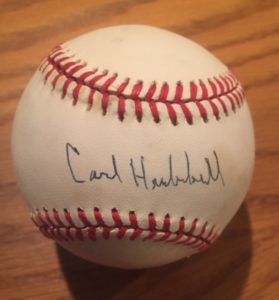 The record for strikeouts by a pitcher in an All Star Game is six – Carl Hubbell (1934); Johnny Vander Meer (1943); Larry Jansen (1950); Fergie Jenkins (1967). Given today’s hard-throwing/free swinging brand of baseball, we may very well see that six-whiff record equaled or surpassed. But I doubt if anyone will match Hubbell’s 1934 feat of fanning six future Hall of Famers in the same All Star Game (five consecutively). King Carl, on his way to a 21-win season (the second of five straight 20+ win campaigns), came into the game with a 12-5, 2.76 ERA regular-season stat line. Hubbell had struck out 58 hitters in 156 1/3 innings pitched to that point (it was, indeed, a difference game back then), but he was about to make the strikeout a much bigger part of his game.
The record for strikeouts by a pitcher in an All Star Game is six – Carl Hubbell (1934); Johnny Vander Meer (1943); Larry Jansen (1950); Fergie Jenkins (1967). Given today’s hard-throwing/free swinging brand of baseball, we may very well see that six-whiff record equaled or surpassed. But I doubt if anyone will match Hubbell’s 1934 feat of fanning six future Hall of Famers in the same All Star Game (five consecutively). King Carl, on his way to a 21-win season (the second of five straight 20+ win campaigns), came into the game with a 12-5, 2.76 ERA regular-season stat line. Hubbell had struck out 58 hitters in 156 1/3 innings pitched to that point (it was, indeed, a difference game back then), but he was about to make the strikeout a much bigger part of his game.
The game was played on July 10, 1934 at New York’s Polo Grounds – with screwball-specialist Hubbell starting for the NL and Yankee Lefty Gomez starting for the AL. Facing an AL line up stacked with some of the game’s greatest hitters, Hubbell got off to a rocky start, giving up a lead-off single to Detroit 2B Charlie Gehringer, followed by a walk to Senators’ LF Heinie Manusch. Then the fun began, as Hubbell set down five straight future Hall of Famers – all on strikeouts – Yankees’ RF Babe Ruth, Yankees’ 1B Lou Gehrig, and Athletics’ 3B Jimmie Foxx to close out the first. Hubbell then fanned White Sox’ CF Al Simmons and Senators’ SS Joe Cronin to open the second – giving him five straight strikeouts, all future HOFers. Hubbell then gave up a single to Yankees’ C Bill Dickey, before whiffing Yankees’ P Lefty Gomez (also a future Hall of Famer, although as a pitcher not a hitter) to end the inning. After an uneventful third inning – two fly outs, a ground out and walk – Hubbell left the game credited with three scoreless innings, two hits, two walks and six strikeouts.
Oh yes, the AL won the game 9-7, and Hubbell’s feat was amplified by how those HOF whiff victims fared over the rest of the game. Against pitchers not named Hubbell, they went seven-for-sixteen, with four doubles, five runs scored and three RBI.
_____________________________________________________________
ASG EXTRA – KING CARL SAID IT
“There were 50,00 fans or more there, and they wanted to see the best you’ve got. There was an obligation to the people, as well as to ourselves, to go all out. “
Carl Hubbell, nine -time All Star, comment on the 1934 All Star Game
_________________________________
The Year of the Pitcher, Indeed
Not a single run batted in was recorded in the 1968 All Star Game (despite the presence of such future Hall of Fame batsmen as Henry Aaron, Willie Mays, Willie McCovey, Carl Yastrzemski, Mickey Mantle, Johnny Bench, Harmon Killebrew, Frank Howard and more). The game’s only run scored in the bottom of the first inning. CF Willie Mays led off with a single to left (off Luis Tiant). Mays went to second on an errant pick-off attempt and to third on a wild pitch that was part of a walk to LF Curt Flood. 1B Willie McCovey then grounded into a 4-6-3 double play, with Mays scoring, (No RBI is awarded on a double play. The game ended by that 1-0 score, with the AL getting just three hits and the NL only five. A total of 12 pttchers gave up the eight hits,and six walks, while fanning 20.
ASG Memorable Moment Number Four … Larry Jansen in relief – 1950
Giants’ right-hander Larry Jansen came into the 1950 All Star Game with a 9-5, 2.98 record. He came on in the seventh inning, with his NL squad trailing 3-2, He turned in a truly memorable performance. It went like this:
Seventh Inning
Tigers’ P Art Houtteman – Strikeout
Yankees’ SS Phil Rizzuto – Pop Out (C)
Indians’ CF Larry Doby – Strikeout
Eighth Inning
Tigers’ 3B George Kell – Strikeout
Red Sox ‘ LF Ted Williams – Strikeout
Athletics’ 1B Ferris Fain – Fly Out (SS)
Ninth Inning
Yankees’ RF Joe DiMaggio – Fly Out (CF)
Indians’ C Jim Hegan – Strikeout
Yankees’ 2B Jerry Coleman – Strikeout
Tenth Inning
Yankees’ P Allie Reynolds – Ground out (3B-1B)
Rizzuto – Fly Out (SS)
Doby – Single (CF)
Kell – Ground out (SS-2B)
Eleventh Inning
Red Sox’ LF Dom DiMaggio – Ground out (SS-1B)
Fain – Ground out (1B-P)
J. DiMaggio – Foul pop out (C)
There it was:
- Five innings of relief (second-most innings ever pitched in an All Star Game);
- Six strikeouts (tied for the most in an All Star Game);
- No runs, just one hit and only two balls it out of the infield.
When Jansen left the game, the score was tied at three apiece, with the NL eventually winning 4-3 in 14 frames. Jansen,by the way, pitched in nine MLB seasons, going 122-89, 3.58. He was a two-time All Star (1950-151) and led the NL in wins with 23 (23-11, 3.04) in 1951. He won 21 games (five losses, 3.16 ERA) as a 26-year-old rookie in 1947 – finishing second to Jackie Robinson in the Rookie of the Year Voting.
_______________________________________________
Ouch!
The 1950 All Star Game was made even more memorable by the fact that Ted William made a leaping, off-the-wall catch on a line drive by Ralph Kiner in the first inning. Williams played through the pain (nine innings) and even drove in a run with a fifth-inning single off Don Newcombe. The pain persisted and, it turns out, William had fractured his elbow making that first-inning catch and didn’t play again until early September.
_______________________________________
ASG Memorable Moments Number Five … Lefty Gomez’ Quality Start – 1935
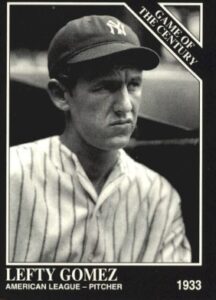 MLB defines a quality start as one of six innings or more with three or fewer earned runs given up. Now, you can argue (correctly, I believe) that 4.50 ERA may not constitute a quality start. Given today’s All Star Game expectation of one, two or at the very most three-inning pitching appearances, you can confidently say we will not see another quality start in the All Star Game. Historically, there has only been one. The Yankees’ Lefty Gomez (a future Hall of Famer) tossed an All Star Game-record six innings in 1935 – giving up just three hits and one run. Also falling into the “We’ll never see that again” category – the American League used just two pitchers in their 4-1 win, Gomez and the Indians’ Mel Harder.
MLB defines a quality start as one of six innings or more with three or fewer earned runs given up. Now, you can argue (correctly, I believe) that 4.50 ERA may not constitute a quality start. Given today’s All Star Game expectation of one, two or at the very most three-inning pitching appearances, you can confidently say we will not see another quality start in the All Star Game. Historically, there has only been one. The Yankees’ Lefty Gomez (a future Hall of Famer) tossed an All Star Game-record six innings in 1935 – giving up just three hits and one run. Also falling into the “We’ll never see that again” category – the American League used just two pitchers in their 4-1 win, Gomez and the Indians’ Mel Harder.
Gomez came into the game 8-8, 2.83 on the season, with ten complete games in 15 starts.
By comparison, in the 2022 All Star Game, the two teams used 20 pitchers – and no hurler threw more than one inning.
____________________________________________________
ASG EXTRA … A Pitcher starting two All Star Games in a Single Season
From 1959-1962, MLB featured two All Star Games each season. In 1959, Don Drysdale became the only pitcher to start two MLB All Star Games in a season. On July 7, he started at Forbes Field and held the AL hitless – with four strikeouts – for three innings. (The NL won 5-4). On August 3, he started at the Los Angeles Coliseum and again went three innings, this time giving up three runs on four hits and three walks (fanning five).
____________________________________
ASG EXTRA – GARY SAID IT
“It’s (getting elected to the All Star Game) right up there with lobster.”
Gary Gaetti, tw0-time All Star
___________________________________
ASG Extra – Spreading It Around – Three Five Spots
Gary Sheffield and Moises Alou share the record for the most tams represented at the All Star game at five. Sheffield: Padres, Marlins, Dodgers, Braves, Yankees. Alou: Expos, Marlins, Astros,Cubs, Giants.
Pete Rose played the most positions in All Star Game competition with five – first bases, second base, third base left field, right field.
ASG Memorable Moments Number Six … Gary Carter’s Two-Homer Game – 1981
There have been only five multi-homer games (by a single player) in ASG history (all two-homer contests) and only Hall of Famer Expos’ C Gary Carter managed to hit two long balls in just three plate appearances (all the others took four or five) – and the dingers were key to the National Leagues’ 5-4 win (in Cleveland).
Carter started for the NL and popped out to first base in his first plate appearance (the top of the second in a scoreless game). Carter next led off the top of the fifth with his NL squad trailing 1-0 – and tied the game with a solo shot to left off the first pitch he saw from the Angels’ Ken Forsch (who had just come into the game). Carter again found himself leading off in the seventh, against new pitcher Ron Davis of the Yankees (with the NL now trailing 4-2). Carter again wasted no time, hitting Davis’ first offering over the CF wall to cut the deficit to one. His performance earned him ASG MVP honors. Carter came into the game with a .245-7-30 line on the season. Over his 19-season career (1974-92 … Expos, Mets, Giants Dodgers), the Hall of Famer was a 11-time All Star. He won three Gold Gloves and put up a ,262-324-1,225 offensive stat lie.
_________________________________________________
Players with Two Home Runs in an MLB All Star Game
Arky Vaughn, Pirates …. 1941 (four plate appearances)
Ted Williams, Red Sox …..1946 (five PA)
Al Rosen, Indians ….. 1954 (5 PA)
Willie McCovey, Giants ….. 1969 (4 PA)
Gary Carter, Expos …… 1981 (3 PA)
ASG EXTRA – DEREK SAID IT
“Any player who says they don’t want to go to an All Star Game is lying to you.”
Derek Jeter, 14-time All Star
ASG Memorable Moment Number Seven … Al Rosen’s Two Home Runs and Five RBI – 1954
In 1954, The Indians’ Al Rosen started at 1B for the AL All Star squad; coming into the game with a .313-14-59 record on the season (71 games played). The AL prevailed 11-9, but it’s unlikely they would have won without Rosen’s bat. In the game, Rosen:
- Had three hits (fourth-most in an All Star Game, tie);
- Hit two home runs (tied for the most in an All Star Game);
- Drove in five runs (tied for the most in an All Star Game);
- Collected nine total bases (tied for second-most in an All Star Game).
Here’s how his day went:
- Strikeout to end the first inning (versus the Phillies’ Robin Roberts);
- Three-run homer in the third inning (off Roberts) to break a 0-0 tie;
- Two-run homer in the fifth (off the Giants’ Johnny Antonelli) to tie the game at 7-7;
- Single (off the Braves’ Warren Spahn) in the sixth;
- Walk (off the Braves’ Gene Conley in the eighth).
Rosen was a four-time All Star in his 10-season MLB career (1947-56, all Indians), going .285-192-717. From 1950 through 1953, he averaged .298, with 33 home runs and 117 RBI per season.
___________________________________________________
ASG Memorable Moment Number Eight … Ichiro Suzuki’s Home “RUN” – 2007
The Mariners’ Ichiro Suzuki started the 2007 All Star Game (in San Francisco) leading off (and playing CF) for the AL squad. He had a three-for-three day, won the game’s MVP Award and made a bit of history.
Suzuki singled (off the Padres’ Jake Peavy) to open the game and added a second single (off Ben Sheets of the Brewers) with two outs in the third. The plate appearance that got him on this list came in the fifth inning. Ichiro came up with one out, a runner on first and the AL trailing 1-0. Suzuki stroked the first pitch he saw from the Padres’ Chris Young off the centerfield wall, it took a crazy carom and, before the ball back into the infield, Suzuki had circled the bases, coasting into home plate with a 15-second, two-RUN home RUN – still the only inside-the-parker in All Star Game history. Note: In his MLB career, Suzuki hit 117 regular season home runs and one post-season homer – none of which were inside-the-parkers.
________________________________________________________
ASG Memorable Moment Number Nine … Johnny Vander Meer’s Six Whiffs – 1943
The Cardinals’ Mort Cooper started the 1943 All Star for the National League squad, but the Reds’ Johnny Vander Meer made the most memorable impression. He came on in relief of Cooper in the bottom of the third, with the AL up 4-1, a runner on third and one out. Vander Meer ended the threat by fanning Tigers’ 1B Rudy York and Browns’ CF Chet Laabs. Vander Meer then whiffed Senators’ C Jake Early to open the fourth before giving up a single to Red Sox’ 2B Bobby Doerr and then coming off the mound to field a bunt by Tigers’ pitcher Hall Newhouser and turning it into a pitcher-shortstop-second base (covering first) double play. Although Vander Meer gave up an unearned run in the fifth (on a single, a walk and an error), he also fanned three batters in the inning: Indians’ 3B Ken Keltner, Tigers’ LF Dick Wakefield and York for a second time. In the process, Vander Meer tied the All Star Game record for strikeouts in a game (six). To date, four pitchers have fanned six batters in an All Star Game and Vander Meer is the only one to do it in less than three innings pitched (2 2/3).
____________________________________
Pitchers to Fan Six batters in an All Star Game
1934 Carl Hubbell
1943 Johnny Vander Meer
1950 Larry Jansen
1967 Fergie Jenkins
____________________________________
ASG Extra – Let’s Get This Party Started
Pedro Martinez holds the record for the most consecutive strikeouts to start an All Star Game – at four. The victims were Barry Larkin , Larry Walker, Sammy Sosa and Mark McGwire.
ASG Memorable Moment 10-11-12 (tie) … Ted Williams, Stan Musial, Johnny Callison – Walk – Off Home Runs – 1941, 1955, 1964
There have been just three All Star games ending in a walk-off home run. We’ll call it a tie.
In 1941 (July 8), the NL All Stars were leading the AL squad 5-3 going into the bottom of the ninth. The AL had cut the lead to 5-4, when the Red Sox’ Ted Williams came up (against the Cubs’ Claude Passeau) with a pair of AL “Yankee Joes” on base (DiMaggio on first and Gordon on third. Williams popped a 2-1 pitch for a walk-off, three-run home run and a 7-5 AL win. Williams was two-for-four with four RBI in the game.
On July 12, 1955, the MLB All Star Game (being held in Milwaukee) went into the bottom of the twelfth inning knotted at five apiece. The Cardinals’ Stan Musial led off the bottom of the 12th with a solo, walk-off game winner – deep into the right field seats – off the Red Sox’ Frank Sullivan (who had entered the game with two outs in the eighth inning).
On July 7, 1964, the AL went into the bottom of the ninth (at Shea Stadium) with a 4-3 lead over the NL squad. With the Red Sox’ Dick Radatz on the mound (he had come on in the seventh), Giants’ CF Willie Mays led off with a walk, stole second and scored the tying run on a single by fellow Giant 1B Orlando Cepeda (who was replaced by pinch runner Curt Flood of the Cardinals.) Radatz then got Cardinals’ 3B Ken Boyer on a pop out, intentionally walked Reds’ C Johnny Edwards and struck out pinch hitter Henry Aaron of the Braves. The Phillies’ Johnny Callison (who had entered the game in the fifth inning as a pinch hitter and then took over RF) put an end to the contest with a walk-off, three -run homer to right.
Now, I’m sure all Roundtable readers know plenty about Hall of Famers Williams and Musial, so here’s a bit abut Johnny Callison. Callison enjoyed a 16-season MLB carer (1958-73 … White Sox, Phillies, Cubs, Yankees). He was a three-time All Star and had a career .264-226-840 stat line. He had four seasons of 20+ home runs, with a high of 32 in 1965) and twice led the NL in triples.
ASG Memorable Moment Number Thirteen – Rod Carew’s Two Triples – 1978
A triple is a thing of excitement and beauty and – on July 11, 1978 – batsman Rod Carew provided both for All Star Game fans. Carew led off the game with a triple to left center off the Giants’ Vida Blue and then repeated the feat with another triple off Blue leading off the third. It remains the only two-triple game in All Star Game history. Carew scored after each of his three-baggers, but the American League still lost 7-3. The Hall of Famer won seven batting titles in his 19-season MLB career (1967-85 … Twins, Angels). He was a All Star in 18 of his nineteen seasons – missing only in his age-39 final season, when he hit .280 in 127 games. Carew’s final stat line was .328-92-1,05.
ASG Memorable Moments Number 14-15 … A Tie Among Performances that were more Unforgettable than Memorable
14-15 – Future Hall of Famer Tom Glavine Giving Up Seven Straight Hits -1992
Hall of Famer Tom Glavine started the 1992 All Star Game (he came in with a 13-3, 2.57 record). After retiring American League leadoff hitter Blue Jays’ 2B Robert Alomar on a grounder to second, he surrendered seven consecutive hits – all singles, by the way – to Red Sox ‘ 3B Wade Boggs, Twins’ LF Kirby Puckett, Blue Jays’ RF Joe Carter, A’s 1B Mark McGwire, Orioles’ SS Cal Ripken Jr., Mariners’ CF Ken Griffey Jr. and Indians’ C Sandy Alomar – with the AL plating four runs.
In the process, Glavine set the (still) All Star Game record for hits allowed in an inning – seven. Surprisingly, he finished the frame and came out for the second inning – giving up two more hits and another run before being pulled. He set another record – most hits allowed in an All Star Game appearance at nine. I suppose it could happen, but I seriously doubt in manager would leave pitcher in for this kind of treatment any longer.
14-15 – Roberto Clemente’s Four Strikeouts in an All Star Game – 1967
In the 1967 All Star Game, future Hall of Famer Roberto Clemente fanned in four consecutive at bats against four different pitchers: the Twins’ Dean Chance (third inning); White Sox’ Gary Peters (sixth); Yankees’ Al Downing (ninth); A’s Catfish Hunter (eleventh). He also had a single in the first (Chance) and a ground out in the fourteenth (Hunter). The four whiffs is an All Star Game single-game record for batters.
Roundtable ASG Extra
Atlee Hammaker, holds the record for the most runs surrendered in an All-star Appearance. In the 1983 All Star contest, he gave up seven earned runs on six nits and a walk in just 2/3 of an inning. The big hit was a Fred Lynn Grand Slam – still the only bases-loaded blast in an All Star Game. 1983 was Hammaker only All Star selection in a 12-season MLB career.
____________________________________________
—–A FEW CAREER ALL STAR GAME TIDBITS——
Youngest and Oldest MLB All Stars
The youngest and oldest All Stars ever were both pitchers: Dwight Gooden (19 years-seven month-24 Days) and Satchel Paige (47 years-seven days).
First and still only All Star Game Steal of Home … 1934 AS game, fifth inning, two out, two on, NL trailing 8-6, NL 3B Pie Traynor (Pirates) notched the first (and still only) AS Game steal of home. (AL won game 9-7.)
First and still only All Star Game Grand Slam … 1983 All Star Game, third inning, bases loaded, two outs, AL leading 5-1, AL CF Fred Lynn hit the first – and still only – All Star Game Grand Slam. (AL wins 13-3)
First All Star Game MVP … MLB began recognizing the All Star Game MVP in 1962 and the first winner was the Dodgers’ Maury Wills – who didn’t enter the game until the sixth inning (the Pirates’ Dick Groat started at SS) and only came to the plate once. Wills came in as a pinch runner for Stan Musial, who had singled off the Twins’ Camilo Pascual to open the inning. Wills quickly stole second and scored the game’s first run on a single by Groat (whom Wills would replace at SS). Wills came to the plate in the eighth, with his NL squad up 2-1. He led off the inning with a single (off the Indians’ Dick Donovan), advanced to third on a single by Giants’ 3B Jim Davenport and scored on a foul ball fly out off the bat of Giants’ RF Felipe Alou.
–—ALL STAR GAME TARGETS—–
Most Hits in an All Star Game … Four – Joe Medwick (1937); Ted Williams (1946); Carl Yastrzemski (1970)
Most Doubles in an ASG … Two – Nine players (Most recently, the Brewers’ Jonathan LeCroy in 2014. (No surprise, LeCroy had a league-leading 53 doubles that season.)
Most Triples in an ASG … Two – Rod Carew (1978)
Most Home Runs in an ASG … Two – Arky Vaughn (1941); Ted Williams (1946); Al Rosen (1954); Willie McCovey (1969); Gary Carter (1981)
Most RBI in an ASG … Five – Ted Williams (1946); Al Rosen (1954)
Most Walks in an ASG … Three – Charlie Gehringer (1934); Phil Cavarretta (1944)
Most Stolen Bases in an ASG … Two – Willie Mays (1963); Kelly Gruber (1990); Roberto Alomar (1992); Kenny Lofton (1996); Starlin Castro (2011)
Most Innings Pitched in an ASG … Six – Lefty Gomez (1935)
Most Strikeouts in an ASG … Six – Carl Hubbell (1934); Johnny Vander Meer (1943); Larry Jansen (1950: Fergie Jenkins (1967)
Most Consecutive Strikeouts in an ASG … Five – Carl Hubbell (1934); Fernando Valenzuela (1986)
–—CAREER ALL STAR GAME RECORDS—–
AS Game Hits … Willie Mays – 23
AS Game Doubles … Dave Winfield – 7
AS Game Triples …Willie Mays and Brooks Robinson – 3
AS Game Home Runs … Stan Musial – 6
Stan Musial hit .317 in 24 All Star games with two doubles, six home runs,10 RBI, and 11 runs scored.
AS Game RBI… Ted Williams – 12
AS Game Walks …Ted Williams – 11
Ted Williams hit .304 in 19 All Star Games, with two doubles, one triple, four home runs, 12 RBI and a.439 on-base percentage.
AS Game Stolen Bases … Willie Mays – 6
Willie Mays stole six ASG bases in seven attempts. The most ASG steals without being caught belong to Roberto Alomar and Kenny Lofton at five each.
AS Game Runs Scored …Willie Mays – 20
PHOTO: New York World-Telegram and the Sun staff photographer, William C. Greene, Public domain, via Wikimedia Commons
Willie Mays hit .307 in 24 All Star games, with two doubles, three triples, three home runs, nine RBI, 20 runs scored and six stolen bases.
AS Game Pitcher Wins … Lefty Gomez – 3
AS Game Total Pitching Appearances … Roger Clemens – 10
AS Games Started (pitcher) … Lefty Gomez, Robin Roberts, Don Drysdale – 5
Lefty Gomez went 3-1, 2.50 in five All Star Game starts (18 innings pitched).
AS Game Saves ... Mariano Rivera – 4
AS Games Innings Pitched … Don Drysdale – 19 1/3
Mel Harder has pitched the most All Star Game innings without surrendering an earned run (13).
AS Game Strikeouts … Don Drysdale – 19
Don Drysdale went 2-1, 1.40 in All Star games, fanning 19 batters in 19 1/3 innings (10 hits, four walks).
_______________________________________________________
All Star Game Scoring Bookends
The highest scoring All Star Game ever took place in 1998 at (Where Else?) Coors Field – as the teams combined for 21 runs in a 13-8 American League win. Side note: Thirteen is the highest run total ever up by an All Star squad, accomplished by The AL in 1983, 1992 and 1998.
The lowest scoring game (combined) took place in (When else?) in 1968 (The Year of the Pitcher) – as the NL topped the AL 1-0. with the only run scoring on a double play (no RBI in the contest).
_________________________________________________________
Finally, to wrap up, here’s a dozen AS Game firsts from 1933.
First Venue: Comiskey Park 1 (July 6, 1933).
First AS Game Attendance: 47,595
Final Score of First AS Game: AL 4 – NL -2
First Batter/Pitcher Match Up: NL 3B Pepper Martin (Cardinals) versus Lefty Gomez (Yankees). Gomez retired Martin on a grounder to shortstop.
First Starting Pitchers: AL, Lefty Gomez (Yankees) – NL, Bill Hallahan (Cardinals). Gomez got the first All Star win, Hallahan the first loss.
First Hit: Cardinals’ Chick Hafey (leading off second inning – off the Yankees’ Lefty Gomez). Hafey was starting in LF and batting fourth for the NL.
First Run Scored: AL starting 3B Jimmy Dykes (White Sox).
First RBI: AL starting pitcher Lefty Gomez (Yankees) – drove home Jimmy Dykes (White Sox), who had walked, with a single to center field. Take that, DH Rule.
First Double: Pie Traynor (Pirates), NL pinch hitter – top of seventh off Lefty Grove (Yankees).
First Triple: NL pitcher Lon Warneke (Cubs) – top of the sixth inning off Alvin Crowder (Senators). Take that again, DH Rule.
First Home Run: AL RF Babe Ruth (Yankees), two-run home run, bottom of the third, off Bill Hallahan (Cardinals). So, your first All Star Game double, triple and homer were hit by pitchers or former pitchers.
First Stolen Base: Bottom of first, AL 2B Charlie Gehringer (Tigers).
First Strikeout: Final out, top of second. Pitcher – Lefty Gomez (Yankees). Hitter – NL SS Dick Bartell (Phillies).
Primary Resources: Baseball-Reference.com; Baseball-Almanac.com
Baseball Roundtable – Blogging Baseball Since 2012.

 Baseball Roundtable is on the Feedspot list of the Top 100 Baseball Blogs. To see the full list, click here.
Baseball Roundtable is on the Feedspot list of the Top 100 Baseball Blogs. To see the full list, click here.
Baseball Roundtable is also on the Anytime Baseball Supply Top 66 Baseball Sites list. For the full list, click here.
I tweet (on X) baseball @DavidBaseballRT
Follow/Like Baseball Roundtable’s Facebook Page here. Find More baseball commentary; blog post notifications; PRIZES.
Member: Society for American Baseball Research (SABR); Negro Leagues Baseball Museum; The Baseball Reliquary.




